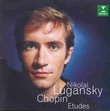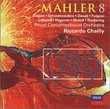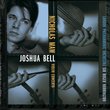| All Artists: George Frideric Handel, Colin Davis, London Symphony Orchestra, Susan Gritton, Sara Mingardo, Mark Padmore, Alastair Miles, Tenebrae Choir Title: Handel - Messiah / Gritton, Mingardo, Padmore, Miles, Tenebrae Choir, LSO, Sir Colin Davis [includes DVD] Members Wishing: 1 Total Copies: 0 Label: LSO Live (UK) Original Release Date: 1/1/2007 Re-Release Date: 10/9/2007 Album Type: Live, Hybrid SACD - DSD, Import Genre: Classical Styles: Opera & Classical Vocal, Historical Periods, Baroque (c.1600-1750), Symphonies Number of Discs: 2 SwapaCD Credits: 2 UPC: 822231160724 |
Search - George Frideric Handel, Colin Davis, London Symphony Orchestra :: Handel - Messiah / Gritton, Mingardo, Padmore, Miles, Tenebrae Choir, LSO, Sir Colin Davis [includes DVD]
![Handel - Messiah / Gritton, Mingardo, Padmore, Miles, Tenebrae Choir, LSO, Sir Colin Davis [includes DVD]](/images/no_cover/l.png?v=a4e11020) | George Frideric Handel, Colin Davis, London Symphony Orchestra Handel - Messiah / Gritton, Mingardo, Padmore, Miles, Tenebrae Choir, LSO, Sir Colin Davis [includes DVD] Genre: Classical
With an outstanding solo quartet and a great chorus and orchestra, Davis leads a sterling performance that challenges the supremacy of his 1966 Philips recording of Messiah. Davis leads a dramatic performance; the famous "... more » |
CD DetailsSynopsis
Amazon.com With an outstanding solo quartet and a great chorus and orchestra, Davis leads a sterling performance that challenges the supremacy of his 1966 Philips recording of Messiah. Davis leads a dramatic performance; the famous "Hallelujah" chorus appropriately grand, the final "Amen" bristling with brazen energy, both sung with extraordinary tonal coloring and precise articulation by the chorus, which also shines in a lithe "He shall purify" and a vividly virtuoso "For unto us a child is born." Soprano Susan Gritton's solos are a delight, whether in the measured "Behold, a virgin shall conceive" or her exuberant "Rejoice greatly." The vocal purity of her "I know my redeemer liveth" makes this track a highlight. Alto Sara Mingardo's darker tones are especially moving in her arias and dramatic in "He was despised." The men are almost as good; Alistair Miles sonorous in the bass arias and Mark Padmore recovering nicely after a somewhat mannered "Evr'y valley." The LSO is in excellent form too, the strings expressive in the orchestral interludes and the brass shining brightly in the big choruses of Part III, where the tympani thwacks are startling in their power. --Dan Davis Similarly Requested CDs
|
CD Reviews(Revised) An uneven performance with great virtues; Colin Da RENS | Dover, NH USA | 12/22/2007 (2 out of 5 stars) "I have found this a very difficult performance to evaluate. Each time I have listened to it, I have done so using different equipment under different circumstances. What follows is a thoroughly revised review: With each of my three sets of speakers, the sound stage sounds shallow (typical of the Barbican) and exposes every possible lack or lapse. With earphones of superior quality, however, the sound stage has not only wide stereo spread but also a sense of depth and an added richness to the lower frequencies. When listening and watching the performance excerpts on the DVD, the sound is bright and clear, occasionally a bit shrill. In all circumstances, the entire recording sounds over-miked, resulting in a disconcerting "in your face" quality. Oddly enough, the continuo is barely audible (which the conductor may have intended), except for the organ in some of the choruses. I think that the London Symphony Orchestra is one of the best in Europe and ineed in the world. Certainly no other orchestra plays so many different kinds of music and so often and under the direction of so many conductors in the course of a year. And they always rise to the occasion. In this case, the string playing sounds thinner through the various speaker systems than it does through the earphones. Upon first hearing it sounded to me as if at times the attacks were scrappy or the initial intonation not quite right. Upon further hearings I have either gotten used to the performance or I was mistaken to begin with but for one or two incidents early on. And, yes (with a salute to the Amazon editorial reviewer) the tympani do sound out this time around more than in 1966, most probably because of the use of harder heads on the sticks and more recent developments in our understanding of how tympani were intended to function and sound in the 18th century. One hears similar clarity and enthusiasm in recordings of 18th century music overseen and conducted by Rene Jacobs, Philippe Herreweghe or John Eliot Gardiner, for instance. The well-known and admirable soloists astonishingly seem not up to their usual standards, with the exception of Mark Padmore, who sounds not quite warmed up in his recitative and aria following the overture and then sounds open, relaxed and in top form throughout the rest of the performance. I have much enjoyed the voice and musicianship of Alastair Miles in the past, but in this recording his voice sounds tired, covered, and forced from beginning to end. Susan Gritten and Sara Mingardo sing well enough on the whole but have uneven moments and persistently excessive (to my ears, anyway) vibrato. The fifth soloist is Sir Colin Davis, who grunts and hums and half sings along on and off throughout the performance. That he does so is not necessarily a problem, for I have seen him conduct many times in concerts at Boston's Symphony Hall and elsewhere and know that the audience does not hear this. But the recording engineers should have been able to avoid picking up these sounds. You can also see as well as hear him doing it on the DVD. Please do not misunderstand me: I think that Colin Davis is one of the very great conductors of the second half of the 20th century and into the present decade. I cannot imagine being without his recordings of Sibelius, Berlioz, Mozart, and Brahms, to name but a few. When I first heard the chorus I thought that they did not blend well and often sounded forced and raw. Now I admire them for their beautiful phrasing of the music and their emotional commitment to the meaning of the words. This is of course most evident when watching the DVD. Still, often one hears a given voice standing out from the others and the thrill of a blended sound is lost momentarily and distractingly. And their vocal production, even given their excellent sense of pitch and rhythm and enunciation, has something of a raw edge or untrained quality to it. I've gotten used to it and accept it as part of their sincerity, but I still wish it weren't so. Sir Colin's 1966 recording with the LSO has superior sound in its 2001 remastered edition, soloists all of whom are in their prime and who sing with confidence and insight, and a chorus that produces what I would call a more refined yet none the less powerful sound. The 1966 Handel: Messiah deserves its lasting and rock-solid reputation as a great and influential recording of Messiah. The improved sound of the imported release in Philips's "50th" series is worth every penny, but the less expensive Philips "Duo" edition provides good listening, too. So, at first I found this most recent Colin Davis Messiah to be a profound disappointment, and I still have trouble with it, depending upon how and where I listen to it. I now find it no longer a disappointment, even if it does not offer the mountain-top experience of the 1966 recording with the same conductor and orchestra but a different chorus. I now find great pleasure in listening to it, in spite of the problems I have with three of the soloists and Sir Colin's sotto voce obligatto. And, I must add, I miss varied ornamentation in the arias. In 1966 added vocal ornamentation was minimal, but at least it was there and considered innovative at the time. I have found two Messiahs that fascinate my heart, mind, and soul every time I turn to them: Sir John Eliot Gardiner's (Philips) and Paul McCreesh's (DG Archiv). Once one hears the overture and the opening "Comfort ye" by the superb tenor soloists, one is committed to listening to either performance in its entirety. Harnoncourt's recent release (Deutsche Harmonia Mundi) is also beautifuly performed, always interesting if not always fully convincing; it is worth the price of purchase just for the singing of bass-baritone Gerald Finley. Each of these three recordings differs in matters of the choice of edition and of baroque performance practice, but each is masterful in its own way. I rather wish that the LSO had released this Messiah only on DVD. It is best seen as well as heard. The 1966 version cannot be seen, but it should be heard. One hopes that it returns repeatedly to the catalogue of available recordings. The Amazon system does not allow me to change the number of stars in my rating. I would certainly go to at least *** , perhaps to **** now that I have had occasion to review and reevaluate this recording." Handelian Masterpiece MDK | NJ | 12/22/2007 (5 out of 5 stars) "Sir Colin caps a brilliant career with a beautifully performed Messiah. The soloists are near perfect. Sara Mingardo's deep contralto voice is sublime and beautiful. Susan Gritton's coloratura passages are accurate and flowing. The chorus is first rate and sharp. The large powerful LSO gives Messiah the energy it needs. The recording is technically excellent with great spatial imaging, particularly when played back in SACD with surround sound. Tempos are perfect, rivaled by Andrew Parrott's recording with Emma Kirkby. For a fascinating "spin" on Messiah, listen to the Mozart version." Stick With Philips, 1966 Virginia Opera Fan | Falls Church, VA USA | 12/18/2008 (3 out of 5 stars) "I found a used copy of this set for peanuts, so I thought I'd give it a try. Personally, I don't think it comes close to Davis' 1966 effort for Philips. That set, along with the roughly contemporaneous Charles Mackerras (EMI) and Robert Shaw (RCA) sets taught my generation a new way of listening to this warhorse. It is, however, better than Davis' early digital era set with Bavarian forces (also Philips).
I do not care for some of the conductor's interpretive decisions - the crooning of the choruses "Behold the lamb of God," "And with His stripes we are healed (which seemed to be sung unaccompanied)," and to an extent, the final "Amen". "Worthy is the Lamb" displays some odd articulation silences that interfere with the musical flow. The conductor also deletes the orchestral ritornello from the repeat of the "A" section of "He was despised" converting the only full da capo air in the oratorio to dal segno. The soloists are ok, but no paragons. Susan Gritton sounds edgy and sometimes breaks the line to take a breath. Sara Mingardo has a nice contralto voice, but I don't care for the accent. Mark Padmore sang better for Christie on Harmonia Mundi a number of years back. Here he is more effortful and overemphatic. Alastair Miles compares unfavorably with his younger self with Cleobury on Argo. The chorus acquits itself pretty well, but the sections don't blend very well and individual voices seem to stick out from the overall texture. The sopranos show a tendency to yelp - in "All we like sheep" for example. I can't fault their enthusiasm, though. The London Symphony Orchestra plays well, but the recorded sound doesn't show them to the best advantage. Producer Mallinson and the recording team don't seem to have figured out a way to best represent the Barbican. String tone is wiry, a characteristic shared by the Haitink Beethoven cycle also produced by Mallinson. The SACD surround sound may reflect a decision to reproduce a "front row" perspective. Unfortunately, the close perspective also captures the constant obbligato grunts of the conductor a la Glenn Gould. Some recordings just don't resonate with me, and this is one of them. I had hoped Maestro Davis would improve on his earlier efforts. He doesn't. I had also hoped the SACD sound would be something special. It isn't." |

 Track Listings (25) - Disc #1
Track Listings (25) - Disc #1



